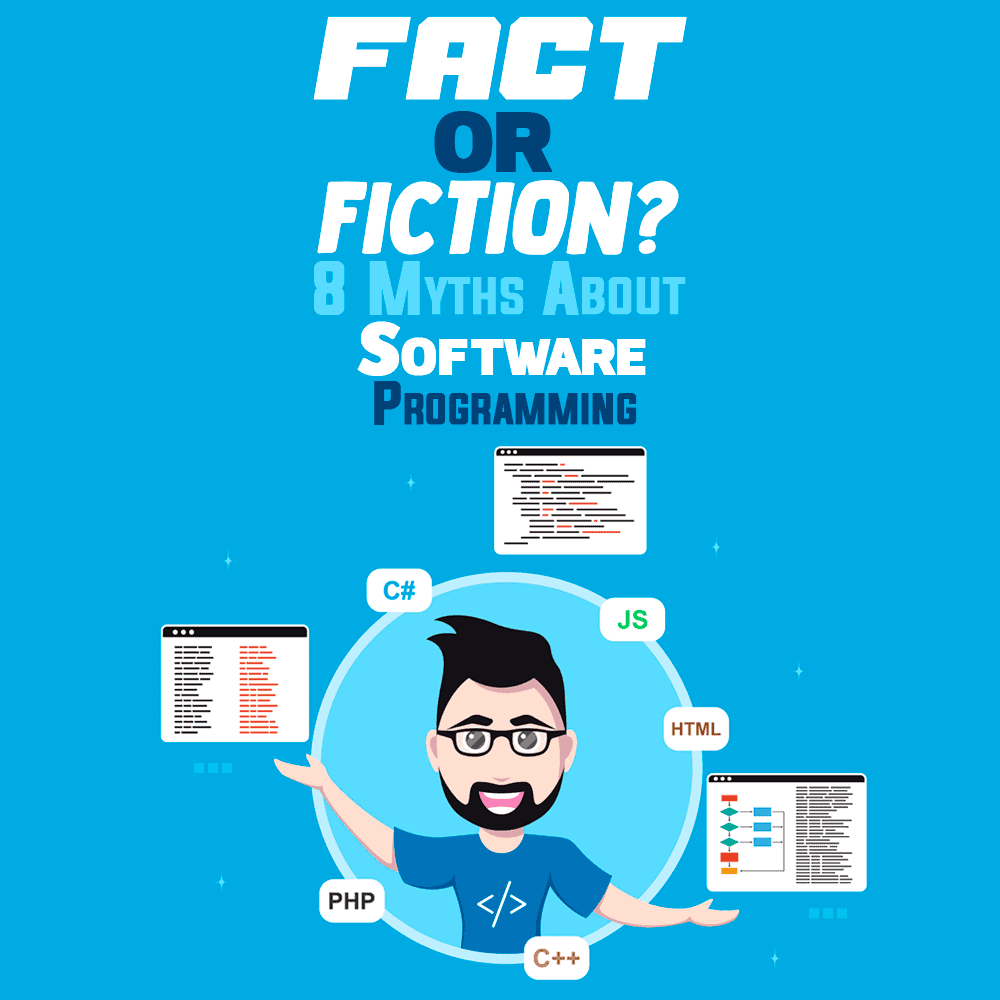
But is that the case?
For better or worse, these myths exist, and it’s not productive to blame people for spreading them. But what we can do is shed light on what is correct and what is a myth. This will benefit us all as programmers.
In this post, I will be debunking the eight most common coding myths by presenting the facts. “Knowledge is power” might be a cliche, but it is so for a reason: Understanding these eight common myths about coding will allow you to be more productive and even happier at your work as a programmer.
Myth 1: Reusable Code Is a Bad Practice
The first myth affirms that deploying reusable code is a bad practice. As a developer, you must of course know which code can make you slip into the trap of repeating code, and it can take some digging to figure out how much is duplicated.
Reusing code often sounds easier than it actually is. Still, you can reuse code if possible, when, for example:
- It’s simple to extend and adapt for a new application.
- It’s ported to different hardware.
- You want to avoid faults or issues that could jeopardize the new application’s dependability, safety, or security.
And so, reusing code is not necessarily wrong. A web framework can also help you reduce the amount of code you write. As a developer, you can learn a few web frameworks to understand code reusability and how to use standard codes.
Myth 2: Your Choice of Programming Language Does Not Matter if You Are Proficient
Well, this is the biggest myth of all times, and undoubtedly there are many people falling prey to it.
To me, the choice of programming languages is of the topmost priority because it decides the future of my application. Programming languages are developed constantly to make developers’ lives easier. So, when there are a lot of options, switching between languages is quite normal.
The myth here appears true to those with expertise in one specific language. Their logic behind preferring their language is just their expertise and also the fact they don’t need anyone else when it comes to any challenges regarding the language.
Technically, choosing a language should be dependent on your app and your industry. The idea that developers can choose any language they want—rather than what suits their apps the most—is a myth. If needed, it’s a good idea to seek help from third-party IT outsourcing companies who are specialists and can guide you to the desired outcomes.
Myth 3: More Eyes on the Code Means Fewer Bugs
Developers might believe that the more the eyes that scan the code, the fewer the bugs. Well, this is definitely a myth because keeping a constant eye on the code is just not enough; we need to have the ability to correct the bugs, too.
Many open-source developers are confident that if the bugs are identified, they are halfway to solving the problem. But no, that’s not the case. The myth goes something like this: Open-source software has an inherent advantage over proprietary software. Since anybody may evaluate it, it means they can uncover flaws and fix them.
Regrettably, that is just wishful thinking.
The fact that bugs can be found does not guarantee that they will be found. Today, the majority of open-source projects have significantly more users than contributors. Many people don’t look at the source code at all, so the total number of people involved in most projects is inflated.
Just having many eyes looking for bugs will not near-magically decrease their numbers. Rather, spotting and correcting errors should be done as part of proper procedures and methodology. Testers can use regression testing to spot recurring errors and eliminate all other unfocused errors, which could be missed otherwise.
Myth 4: Developers Must Learn Only the Best Programming Languages
Who defines the best programming language? Well, there is no such thing—or, if you’d like to see its other side, the best programming language is the one that best suits your current needs.
And so, I must bust this myth, as there are some excellent programming languages for particular purposes. If you’re a beginner, Python is a wonderful place to start because of its ease of use, readability, and versatility. Java is also simple to learn and, best of all, it comes with rich documentation and a devoted following, or you can leap right into C# like I did.
After that, you must choose your programming language depending on the speed, unique features, compatibility, maintainability, and other factors of your developing app.
Myth 5: Success of Code Is Guaranteed by Skills
Well, I beg to differ. Though part of it might be true—in that good skills are required—the fact is that skills alone cannot guarantee you a good quality of code. It is experience and knowledge that also play a vital role in making the source code successful.
In reality, a software team might fail regardless of the qualifications or skills of its members. As I mentioned above, experience and knowledge of dealing with unique apps and their code issues make communication usually the most critical aspect of a software development team.
Team members who, apart from expertise in their programming language, also have excellent communication skills will simply do better than those who lack soft skills. It doesn’t matter how skilled a coder you are; the ability to understand the requirements, implement code easily, deliver good quality, and collaborate with others are the most important factors that will set you apart from the competition.
Myth 6: Not All Code Needs Backup
This is a myth because this generally doesn’t happen with most developers. But if you recognize yourself in this statement, you can learn how to use Git. This will help you manage your files easily without losing any data or information.
It doesn’t matter what version control software you use as long as you know how to utilize it properly. If your computer or network breaks, you won’t lose a critical modification. New developers will find it annoying, and veteran developers will find it disastrous, but only if they do not acquire a habit to secure their code.
Myth 7: Good Coders Need To Work for Long Hours

As per the statistics, there are many geeky developers working for an average of 56 hours per week to deliver the best code. But the truth is that working long hours doesn’t necessarily guarantee results. This myth remains persistent among developers, and there are many who think they need to work overtime to meet deadlines.
Practically speaking, a project should be designed in a way that it sets realistic deadlines. The sprints decided in the beginning of the project should not require extra hours by the developers, and the scheduled timeline should be met without any compromise to quality of code or performance.
Maybe some projects show fuzzy and unrealistic deadlines because they are poorly designed. Programmers are then forced to chase a deployment date, and in such cases, one can expect neither errorless coding nor high morale.
Myth 8: New Tools Bring Better Results
Since technology is everything in the software business, this myth seems to be true. If you choose the latest-and-greatest tool for your business, you should end up getting fruitful results, right?
Right?
Well, not quite. There have been enterprises that have tried out newer, advancing technologies in an attempt to get ahead of competitors. But the “latest and greatest” technology does not assure success.
The biggest example of it is Twitter, which is the most prominent and largest company in the world to operate on a Ruby on Rails platform. But soon after they faced scalability and performance concerns, they shifted their focus and rewrote the code in Scala before they made a move to JVM.
This shows that not all new tools can bring fruitful results at once; sometimes you have to go back to the traditional approach. Similarly, there are other leading companies like Reddit, Yammer, and Yahoo that have also let go of the thought that new tools necessarily bring better results. The reality is quite different from the myth.
Meet the Real World of Programming
In this post, I debunked the top eight myths of the programming community. Some of these myths can sound plausible—for example, that new tools necessarily bring good results or that coders need to learn just one programming language.
So let go of these myths, and step into the real world of programming. Hopefully, this post has brought you some clarity, showing how to differentiate between truth and myth and empowering you and your company to gain higher customer engagement and drive greater success.
